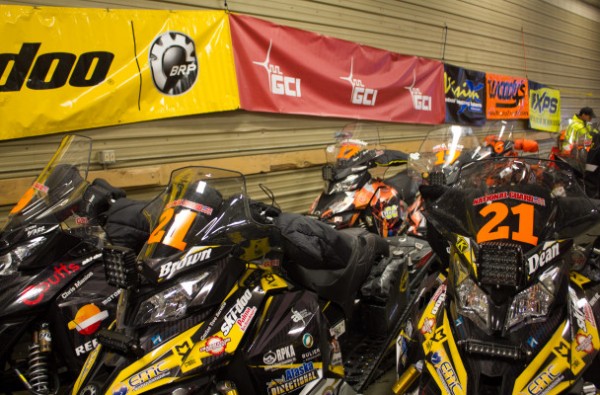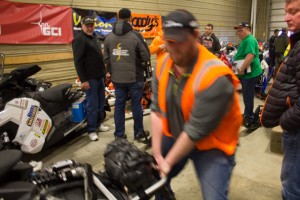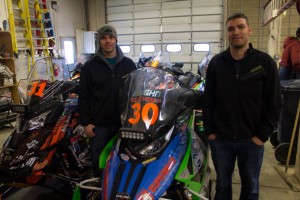2016 Iron Dog snowmachine racers are in the middle of their daylong layover at the race’s halfway point in Nome. Teams have a little time to rest and recuperate from the first one-thousand miles they just logged over the last three days, but they’re also scrambling to repair damage to their snowmachines.
Every minute racers spend on repairs counts against them on the trail.

When you enter the Iron Dog repair garage, the smell of gasoline stings your nose. Fifty-two snowmachines pack the garage from wall to wall, with overflow parking at the firehall next door.
Chris Graeber is a self-proclaimed motorhead. She’s been in the garage all day.
“Today, Wednesday, is our chaos day and this when everybody inspects their sleds and works on them,” Graeber explained.
Racers are given fifteen minutes off the clock to inspect their machines. Graeber, an Iron Dog Race Marshal, is in the garage to make sure they follow the rules. She keeps time as they make any necessary repairs. She said every minute counts.
“You know all racers have strategy,” Graeber explained. “You get a game plan together, you get your tools together, you get your team together, and then you do work time. So the most efficient teams, kind of like a pit crew, get less time added to their course time.”

Volunteers in bright orange vests move machines around while racers in jackets and hats covered in sponsorship logos go about their work.
Team #30 Geoff Crouse and Jerrod Vaugn of Anchorage wait to start their own inspection. Crouse said they’ve already had to make some major repairs on the trail. The motor in one of their snowmachines failed on their way to Koyuk.
“Luckily, we were able to find a garage and get it inside, but it’s just kind of a challenge rounding up parts and tools and getting everything,” Crouse said.
His race partner Jerrod Vaughn reiterated making repairs on the trail isn’t easy.
“It was kind of a frantic, ‘where’s our plane, where’s our pilot, get our parts here.’ At least being here, it’s a little more calm and we have more controlled environment than on the trail when you’re panicking to get everything dialed in,” Vaughn said.
Inside the repair garage, teams get help from two volunteer mechanics. Even though the garage is warm and they can get assistance, Vaughn said it’s still pretty hectic.

“When people are working on the clock, you’ll see stuff flying around and people trying to hurry as fast as they, can because time counts,” Vaughn said.
Vaughn and Crouse had a second engine failure near the checkpoint in White Mountain. They expect repairs will take a few hours. Crouse said, while extra time in the garage might have taken them out of the race, they’re enjoying their time in the Nome.
“It’s a big community, a lot of people helping each other out and everybody’s asking other teams for parts,” Crouse explained. “So, everybody is kind of helping each other.”
After the repairs wrap up, racers will toe a restart line Thursday morning.
Once they leave Nome, each team is on their own again. A thousand miles of remote trail across Alaska’s interior lies ahead of Vaughn, Crouse and the rest of the Iron Dog field. It’s here that racers will find out if the time they spent in the garage pays off.
The first team to the finish line in Fairbanks takes home a $65,000 cash prize.
Emily Russell is the voice of Alaska morning news as Alaska Public Media’s Morning News Host and Producer.
Originally from the Adirondacks in upstate New York, Emily moved to Alaska in 2012. She skied her way through three winters in Fairbanks, earning her Master’s degree in Northern Studies from UAF.
Emily’s career in radio started in Nome in 2015, reporting for KNOM on everything from subsistence whale harvests to housing shortages in Native villages. She then worked for KCAW in Sitka, finally seeing what all the fuss with Southeast, Alaska was all about.
Back on the road system, Emily is looking forward to driving her Subaru around the region to hike, hunt, fish and pick as many berries as possible. When she’s not talking into the mic in the morning, Emily can be found reporting from the peaks above Anchorage to the rivers around Southcentral.




